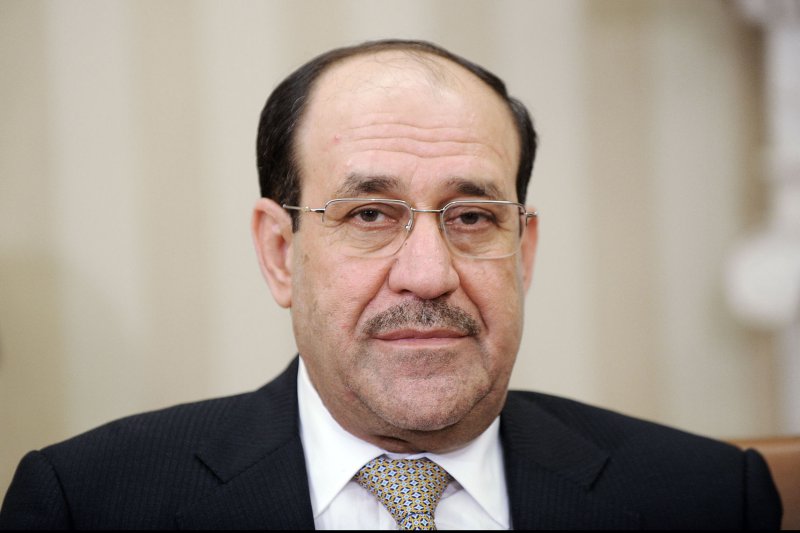In 2012, when Nouri al-Maliki was prime minister, Iraq and Russia signed a $4.2 billion arms contract but the deal was put on hold by Baghdad following a corruption scandal that involved senior Iraqi defense officials. File Pool Photo by Olivier Douliery/UPI |
License Photo
LONDON, Aug. 7 (UPI) -- Iraqi Vice President Nouri al-Maliki called for "Russia's visible presence" in his country following a visit to Moscow that drew controversy in Baghdad.
"We are grateful to you for the role Russia is playing in the region and we have big hopes for you in maintaining the security in the region," Maliki told Russian Foreign Minister Sergei Lavrov, lauding his host's fight against terrorism, TASS reported.
The former Iraqi prime minister expressed fears that Iraq might "be subjected to new challenges in the political sphere and this is linked with interference from outside into the region's internal affairs," in an apparent reference to the United States, a onetime backer that no longer views Maliki favorably.
"Our interest is that friendly Russia should be present in Iraq, thus creating political balance," Maliki said. "We need Russia's more active participation in Iraqi affairs."
Lavrov said that Russia's "aim is to develop further the cooperation."
Following a meeting with Valentina Matviyenko, the speaker of Russia's upper house of parliament, Maliki said: "We want bigger openness and closer friendship with Russia." He added: "Historically, Russia has close relations with Iraq. That is why we would like to see Russia's visible presence in our country, both in terms of politics and defense."
Maliki also met with Russian President Vladimir Putin in St. Petersburg.
"Russia has made a tremendous contribution, in particular in Syria and Iraq, to prevent the disintegration of the region. We sincerely thank you," Maliki told Putin. "Were it not for your role, the map of the region would have changed now and negatively for us."
Maliki, who is viewed by many Iraqis as an Iran-backed sectarian but influential politician, had frequently expressed opposition to the U.S. presence in Iraq. He was reportedly pressured by the United States to leave office after the fall of Mosul to Islamic State militants in 2014 took place under his watch. He was replaced by Prime Minister Haider al-Abadi.
"Now that ISIS has been declared defeated by the Iraqi government, U.S. officials have campaigned for a prolonged presence in the war-torn nation, something that officials like Maliki are deeply critical of," Tom O'Connor wrote in Newsweek. "Maliki has instead praised the efforts of the U.S.'s primary international rival, Russia."
Dmitry Shugaev, head of Russia's Federal Service for Military Technical Cooperation, said Putin and Maliki discussed possible supplies of Russian-made tanks to Iraq but the talks focused on the "implementation of the existing contracts," TASS reported.
The Kremlin announced in July that Iraq would buy a "large batch" of advanced T-90 tanks in a deal estimated at more than $1 billion.
Baghdad had long relied on importing Soviet- and later Russian-made weapons. Although more American-produced arms entered Iraq after the 2003 U.S.-led invasion, the country remained in need of Russian weapons as Iraqis were accustomed to their use and maintenance.
The arms deal appears to be unrelated to Maliki's call for greater Russian involvement in Iraq because his statements do not reflect the official view of the Iraqi government.
Maliki's critics in Baghdad said his trip to Moscow was an attempt to draw Russian support for a possible future candidacy for Iraq's premiership following the country's April 2018 parliamentary elections.
"Tehran leaders know that the vast majority of Iraqis resent the emergence of Iran as arbiter of their destiny. Russia, however, is seen as remote enough not to pose a direct threat to the internal balance of power in Iraq," wrote Amir Taheri in Asharq Al-Awsat. "Yet, because Russia has no local support base in Iraq, it would have to rely on Iranian guidance and goodwill to play a leading role there."
It is unclear whether Maliki would be able to return to the prime minister's office, at least officially, in Iraq but that hasn't stopped some Russian media outlets from interpreting his statements in Moscow as a reflection of Iraq's foreign policy.
"Given the fact the United States uses oil as a political weapon in the energy war against Russia, one shall assume that Iraq's move to join the Moscow-Tehran-Damascus axis may thus challenge the geopolitical role of the U.S. in the Persian Gulf," Aydin Mehdiyev wrote on the pro- Kremlin website Pravda.ru.
"Baghdad and Moscow have been developing cooperation in the field of defense for several years. This factor indicates that Iraq is no longer a loyal military ally of the United States in the region, like Saudi Arabia and Kuwait," he added.
In 2012, when Maliki was prime minister, Iraq and Russia signed a $4.2 billion arms contract but the deal was put on hold by Baghdad following a corruption scandal that involved senior Iraqi defense officials.
The deal was resumed in 2013 but other obstacles may face the new Iraq-Russia contract.
"The veteran journalist reaction to any Russian arms deal announcement is to note that many deals in the past have taken a long time, if ever, to become reality, especially in large numbers of new-build items," Michael Knights, a Lafer Fellow at the Washington Institute for Near East Policy, told Rudaw English. "So I would say that such a deal will only be a reality when tanks are delivered and money changes hands."
This article originally appeared at The Arab Weekly.















